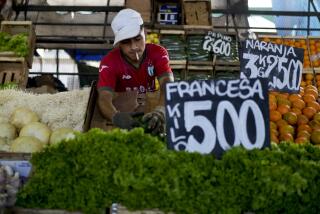Argentina Poised to Devalue Currency
- Share via
BUENOS AIRES — In his first public address since taking office two days earlier, Argentine President Eduardo Duhalde acknowledged Friday that the nation will have to devalue its currency, abandoning the peso’s 10-year parity with the U.S. dollar.
But he declined to say how much value the peso might lose or disclose details of a sweeping economic “salvation” plan he has sent to Congress for debate and approval over the weekend. A tentative unveiling of the plan to the public Friday was postponed until today at the earliest.
“We are broke. We are bankrupt,” Duhalde told a group of business leaders Friday. “Why have we come to this? Some natural circumstance? Is Argentina under a spell? No. We are the ones--Argentine leaders--who have brought this country to these circumstances that afflict us.”
Plenty of Speculation
Local news reports were filled with speculation on details of the rescue package, saying it may include parallel currencies for domestic consumption and trade, steep government spending cuts and the conversion of all dollar-denominated debts up to $100,000 to peso obligations, a way of easing the shock of a devaluation in an economy where dollar obligations dominate.
But Duhalde refused to confirm anything in his talk Friday. To do so would put undue pressure on Congress, he said, which first has to pass a new law junking the peso’s one-to-one “convertibility” to the dollar before a new monetary regime can replace it.
“It is now a given that the devaluation will happen in the country,” Duhalde said.
Economists predict that the peso will marked down to between 1.30 to 1.50 to the dollar and be allowed to devalue further over time in a so-called crawling peg before floating freely once Argentina’s economy stabilizes.
Duhalde, a populist former vice president and provincial governor and a longtime stalwart of Argentina’s left-leaning Peronist party, also denied that he plans to scrap free-market reforms that have changed the face of Argentina’s economy during the last decade.
“No one is thinking of the old protectionism but in taking care and protecting what is ours,” the 60-year-old chief executive said. He reiterated that he is a “transition president” devoted to Argentina’s economic recovery and will not run for office when the term expires in December 2003.
But Duhalde signaled that his program will be a departure from the economics of the past decade, which emphasized opening doors to foreign investment and the privatization of state-owned companies and utilities.
“They have made us think in Argentina that in this new economic order there is only one model possible,” he said. “That’s an absolute fallacy.”
Push for Domestic Goods
Argentina’s deepening crisis is marked by a recession in its fourth year and 18% unemployment. Civil unrest forced the resignation of President Fernando de la Rua on Dec. 20, and he was followed in quick succession by three interim leaders. Duhalde was elected interim president by an emergency session of the legislature Jan. 1.
After two years in which hundreds of thousands of jobs have been lost and the Argentine middle class has been “liquidated,” Duhalde called on the people to “help in this extraordinary task of recovering jobs for Argentines.” He urged citizens to buy domestic goods instead of imports.
“We must awake the national conscience,” Duhalde said.
But a devaluation and spending cuts will almost certainly result in a deeper recession and greater job losses in the short term, economists fear, as a resulting wave of bankruptcies and reduced consumption cause business activity to shrink even further. Changing debts from dollar-based to peso-based could also cause a crisis in the banking system.
More to Read
Sign up for Essential California
The most important California stories and recommendations in your inbox every morning.
You may occasionally receive promotional content from the Los Angeles Times.













